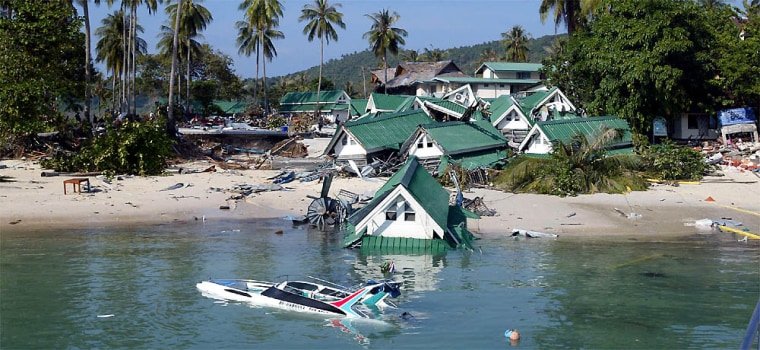The devastation in southern Asian areas hit by tsunami waves this weekend had far less of an economic impact than it might have, given the extreme poverty of many of the regions.
But the sheer scale of dealing with the human tragedy itself could have its own effect on those economies, and other economic costs could also begin piling up, especially if disease spreads because of unsanitary conditions.
One of the biggest immediate concerns was the potential impact on tourism, an important source of foreign exchange earnings, in countries hardest hit by the giant walls of water that came crashing over coastlines Sunday morning.
In the tiny country of the Maldives, a group of islands located about 600 miles southwest of the southern tip of India, tourism makes up more than half of all earnings of foreign currency, according to the CIA World Factbook.
Insured losses could end up being anywhere from several hundred million dollars to a few billion dollars, according to Robert Hartwig, an economist with the Insurance Information Institute in New York. That’s far below the $20 billion insurers paid out in Florida after four hurricanes struck the state this year.
“The biggest coverage costs will be from resorts and from properties owned by multinational corporations” Hartwig said. “The overwhelming majority of losses won’t be covered by insurance in this event.”
And while Jan Egeland, the U.N. Emergency Relief Coordinator, estimated that total damages would likely be in the “many billions of dollars,” investors did not initially seem to see a grave threat to the region’s economy. Some regional stock indexes and tourism-related stocks fell in Asia Monday, but the impact was limited.
Exxon Mobil Corp. suffered a temporary “minor disruption” in its natural gas liquefaction operations outside of Banda Aceh, an Indonesian city on the northern tip of Sumatra island, a company spokesman said. But production was restored by Sunday afternoon. And Pertamina, Indonesia’s state-owned oil and gas company, said Monday that it was loading LNG into ships headed for South Korea and Japan.
Bob Ineson, a natural gas expert at Cambridge Energy Research Associates in Houston, said the bulk of the production and processing that helps make Indonesia the world’s largest exporter of liquefied natural gas takes place off the east coast of Borneo, well out of harm’s way from the epicenter of the quake, which was to the west of Sumatra.
The regions hurt most by the tsunamis did not have much in the way of heavy industry, and many people there lived off the land as farmers and fishermen. Sri Lanka and Indonesia, for example, have only about one-tenth of the economic output per person as the United States.
That means it will be both difficult and expensive for those governments to get help there, said Robert Hormats, an economist with Goldman Sachs in New York.
“The budgetary costs just for the humanitarian relief and reconstruction will be enormous, which will put a lot of pressure on the budgets of countries that are not wealthy,” Hormats said.
Even worse, the likelihood of serious diseases spreading through the region in the aftermath of the quake from contaminated drinking water is sure to have a major economic impact on those countries, Hormats said.
Still, while the cleanup from the devastation will be a daunting task, the resulting economic activity might actually be a boon for the region, said Kathy Bostjancic, a senior economist at Merrill Lynch. With the expected outpouring of economic aid for rebuilding, the economies of the affected countries could actually rise, which could help offset the expected losses in tourism from coastal areas.
Many countries have already pledged millions of dollars in aid to the region. And the World Bank likely will redirect money from existing projects to provide immediate assistance for reconstruction.
AT&T Corp. and MCI Corp. said there have been no disruptions in long-distance telephone and Internet traffic going to and from Southeast Asia, but that damage to local networks may be preventing local phone companies from completing some calls.
Both companies, which don’t operate their own local networks in the region, reported heavier-than-normal calling volumes to the region. An MCI spokeswoman said call completions to Sri Lanka and Maldives “are very limited.” AT&T said it has seen “brief bursts” of heavy calling to the region, especially Sri Lanka, but not enough to overwhelm local phone systems.
